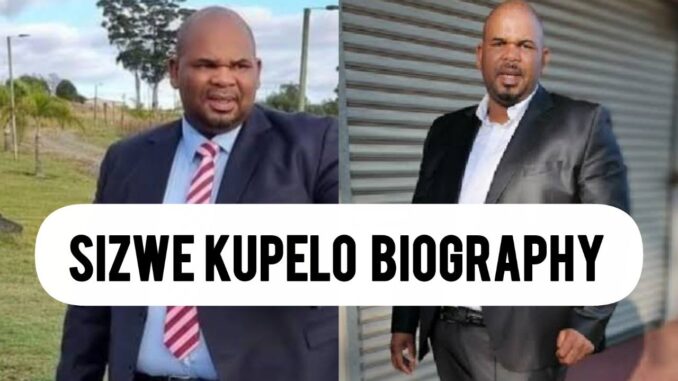
Sizwe Kupelo Biography
Sizwe Kupelo was born on March 5, 1977, in Mthatha, Eastern Cape, South Africa. He began his professional journey as a journalist in the late 1990s, conducting interviews with prominent leaders including Nelson Mandela. By the early 2000s, he transitioned into public service, stepping into a communications role within the Eastern Cape provincial government. Sizwe Kupelo is 48 years old as of 2025.
His first major appointment was as Communications Officer for the Premier’s Office in Bhisho around March–April 2002. Later that same year, he became the Deputy Director of Communications for the provincial Department of Health—a post reflecting both his media expertise and growing influence within government operations. Kupelo also received community recognition when his foundation awarded him an honorary doctorate in 2022, although the institution was later clarified as non-accredited.
Sizwe Kupelo Career
Sizwe Kupelo’s professional journey has always straddled journalism, government communication, and community activism. After his initial roles in Bhisho, he moved into broader provincial communications strategy. He managed media relations for major health campaigns—tuberculosis drives, HIV prevention programs, and rural clinic upgrades—earning praise for improving public trust in government services. Colleagues describe him as the calm voice in crisis, capable of explaining complex policy in everyday language.
In 2008, the launch of the Sizwe Kupelo Foundation marked a new chapter. The foundation’s first project was building emergency shelters after severe floods hit rural villages. Kupelo rallied donations of building materials, organized volunteer crews, and ensured that families received not just temporary roofs but hope for brighter futures. Over the next decade, the foundation expanded to include school supply drives, winter blanket distributions, and a popular mobile soup kitchen that served hundreds during lean months.
In 2022, under Kupelo’s leadership, the foundation spearheaded a national petition calling for a ban on pit bull dog ownership after a series of tragic attacks. They collected over 135,000 signatures, prompting serious debate in Parliament and broad media coverage. Though the ban ultimately stalled, the campaign showcased Kupelo’s ability to mobilize public opinion and bring attention to pressing safety concerns.
Throughout his career, Kupelo maintained ties to journalism. He contributed opinion pieces to national newspapers and appeared on talk shows to discuss health policy, community development, and the changing media landscape. His blend of media savvy, government experience, and charitable work made him a sought-after speaker at conferences and civic forums across South Africa.
Sizwe Kupelo Personal Life
Now in his late 40s, Kupelo has largely kept his private life under wraps. His public persona is defined by energetic communication skills, community service, and advocacy for humanitarian causes. While media coverage highlights his sense of civic duty, details of his family, marital life, tribal affiliation, and religious beliefs are not publicly disclosed. He remains based in the Eastern Cape and maintains close ties to the communities his foundation supports.
Sizwe Kupelo Controversies – Matric Scandal
In 2020, Kupelo’s career faced a sudden upheaval when an internal audit by the Eastern Cape Department of Health flagged discrepancies in his academic credentials. It claimed that his matriculation certificate—submitted in 2002 when he joined the Premier’s Office—did not match Department of Education records. The allegation led to his suspension and a formal disciplinary process. For two years, Sizwe’s reputation hung in the balance.
In December 2022, a departmental committee cleared him of gross dishonesty, concluding that while administrative mistakes may have occurred, there was insufficient evidence to prove deliberate fraud. Kupelo returned to work, his public standing largely intact. But the controversy reignited in April 2024 when the Hawks arrested him on charges of fraud, forgery, and uttering. Investigators alleged he knowingly presented a fraudulent matric certificate dated 2002 to secure his initial appointment.
Released on R30,000 bail, Kupelo pleaded not guilty and described the charges as malicious. He accused political foes of weaponizing paperwork against him. His trial, slated for April 2024, was postponed to July 2025 amid defence preparations and delayed document disclosures.
Court testimony has been dramatic. His former supervisor, Siyanda Manana, testified that Manana only discovered the certificate discrepancy in 2021, long after Kupelo’s hiring. Manana recounted comparing Kupelo’s paperwork with verified certificates from his own family and concluding the fonts and formatting did not match. He reported his findings to the fraud unit and to Umalusi, the education quality council, which confirmed the certificate was not genuine. Yet the disciplinary committee still cleared Kupelo, stating the department would have hired him regardless of the certificate issue.
In court, Manana has clashed with Kupelo’s defence advocate, Mncedisi Simoyi, over whether he held personal animosity or followed standard procedure. Simoyi argues that Kupelo was a headhunted communications expert whose performance justified any deviations from standard qualification requirements. He insists Kupelo never submitted a fake certificate; he simply provided the three documents he possessed—a Standard 10 certificate, an election certificate, and a community radio diploma. The crux of the defence is that the job’s minimum requirements were flexible when Kupelo’s skills were proven.
As the trial continues, Sizwe Kupelo’s case raises wider questions about vetting practices in government, the value of real‑world expertise versus formal qualifications, and the potential for internal politics to drive legal action.
Conclusion
Sizwe Kupelo’s journey—from Mthatha journalist to high‑profile government communicator and charitable leader—reflects both the promise and the pitfalls of public life. He has informed policy, served his community through his foundation’s work, and given a voice to those often overlooked by mainstream media. Yet his career has also been shadowed by serious controversy over his academic credentials and ongoing criminal charges.
His story underscores the importance of transparency, accountability, and fairness in both hiring practices and civic leadership. As his trial unfolds, South Africans will watch closely to see whether the courts confirm his integrity or uphold the charges against him. Regardless of the outcome, Kupelo’s impact on public communication and community service in the Eastern Cape remains significant—an enduring legacy that goes beyond the headlines.
FAQs
What led to Sizwe Kupelo’s suspension in 2020?
An internal audit flagged irregularities in his matriculation certificate submitted in 2002, leading to a fraud inquiry and suspension by the Eastern Cape Department of Health.
What did the disciplinary committee decide in 2022?
The panel cleared him of gross dishonesty, finding no conclusive proof that he intentionally submitted a fake certificate and noting his valuable contributions to government communication.
What charges does he face in his ongoing trial?
He is charged with fraud, forgery, and uttering for allegedly presenting a false matric certificate to secure his initial government job.
What is the Sizwe Kupelo Foundation known for?
Founded in 2008, the foundation provides food, housing support, blankets, and school supplies to vulnerable communities in the Eastern Cape and led a major petition against pit bull ownership.
When will his trial resume?
The East London Commercial Crimes Court has scheduled the trial to continue in July 2025, pending further evidence and defence preparations.

Donald George holds both a Bachelor’s and a Master’s degree in Fine Arts and has spent the past decade honing his craft in Astrophotography and Origami. He has authored numerous academic papers on astrophotography techniques and the art of paper folding, and his work is frequently cited in specialist journals. With ten years of hands‑on experience, Donald combines his artistic vision and technical expertise to push the boundaries of both traditional fine art and Astrophotography.
Leave a Reply